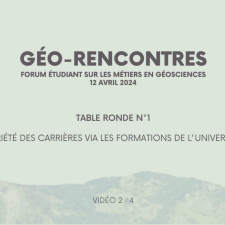Notice
Climate, Geography and Macroeconomics: Revised Data, Refined Analysis and New Findings
- document 1 document 2 document 3
- niveau 1 niveau 2 niveau 3
Descriptif
Assessments of social and economic impacts of climate change are primarily based on the results of biophysical climate impact models, which are aggregated, extrapolated and/or valued in monetary terms. Another potential source of information on climate impacts are spatial and/or temporal analogues, such as Ricardian analysis of climate impacts on agriculture. Another recent effort to this end involves the development of the G-Econ database (Nordhaus, 2006), which describes the relationship between climatic and geographic factors on the one hand and regional economic productivity on the other. A multivariate regression derived from this database has been used to estimate global economic impacts of climate change in a recent version of the DICE model. The reanalysis presented here was motivated by some counterintuitive results in Nordhaus (2006). I have developed a modified version of the GEcon database, which corrects several inconsistencies in G-Econ, and which is available at two different spatial resolutions (grid cells and subnational administrative units). This database is applied to reanalyze key results in Nordhaus (2006) and to perform additional analyses, focussing on the influence of climate on population density, density of economic output, and output per capita. I discuss the implications of several statistical problems in the G-Econ data (skewness, heteroskedasticity, excess zeros, different weights of data points, different spatial resolutions of predictors and predictands) for statistical analysis and assess the sensitivity of results to variations in statistical estimators, aggregation units, and weighting schemes. This reanalysis finds that the counterintuitive results in Nordhaus (2006) can be largely explained by flawed methods for data aggregation and analysis, and by incomplete data in the G-Econ database. Given that several statistical problems have been inadequately addressed by Nordhaus (2006), the validity of estimates of global climate impacts based on G-Econ remains doubtful.
Dans la même collection
-
Holocene Climatic Changes and Their Effect on Morphodynamics and Sedimentation in Campania
AMATO Vincenzo
High-resolution paleoclimatic studies (e.g. 18O, 13C, CH4, MS, ect) provide 38 detailed reconstructions of the Holocene climatic variability, but they don’t are unable to provide direct informations
-
Debate
JOUSSAUME Sylvie
PLANTON Serge
GONZALES ROUCO Jesus Felipe
GOOSSE Hughes
REISSELL Anni
BRASSEUR Guy
The European Science Foundation (ESF) and the French Foundation of the Maison des Sciences de l’Homme (FMSH) (within the Entre-Sciences programme) have agreed to jointly develop a new conference
-
Linking Adaptation and Mitigation for Climate Risk Reduction
SHOGREN Jason F.
How people privately and collectively adapt to climate risk can affect the costs and benefits of public mitigation policy (e.g., Kyoto); an obvious point often neglected in actual policy making.
-
The Effect of Thermal Pollution on Benthic Foraminiferal Assemblages, in the Mediterranean Shore Fa…
ARIELI Ruthie
Over the past several decades public and scientific awareness to global warming has increased significantly. As a result, many studies have examined the affects of global warming. However, the
-
International Negociations on Climate Change: How to Take Advantage of Risk Aversion to Improve the…
THORON Sylvie
Climate change is one of the best examples of global environmental problems. Countries are conscious that they have to find a solution to this global problem at the international level. Negotiations
-
IPCC Working Group I
SOMERVILLE Richard
The European Science Foundation (ESF) and the French Foundation of the Maison des Sciences de l’Homme (FMSH) (within the Entre-Sciences programme) have agreed to jointly develop a new conference
-
Conference Opening
GUIOT Joël
LAUBER Volkmar
The European Science Foundation (ESF) and the French Foundation of the Maison des Sciences de l’Homme (FMSH) (within the Entre-Sciences programme) have agreed to jointly develop a new conference
-
From Climate Models to Earth System Models
BRASSEUR Guy
Complex climate models that describe the evolution of the coupled ocean atmosphere cryosphere system are gradually extended to “non physical” components of the earth system, and account for land
-
Are European Ecosystems Vulnerable to Climate Change
CRAMER Wolfgang
The relatively simple question posed by this title turns out to be complicated in its implementation, for a number of reasons: First, ecosystems have changed in response to changing climate throughout
-
Recent Trends and Vulnerabilities in the Carbon Cycle
CIAIS Philippe
We shall address the coupling between atmospheric circulation and the modelling of ecosystems, to have a better understanding of the carbon cycle, perturbed both by land use and Climate Change. The
-
Interlocking Natural and Social Systems - Resilience, Governance and Research Policy Considerations
SVEDIN Uno
In this presentation the start is made from the 2007 IPCC statement that it now seems consolidated that there is a clear sign of the importance of the anthropogenic factors in the climate change
-
Carbon Offsetting: An Ethical and Psychological Approach
FRAGNIèRE Augustin
The carbon offset market is becoming more and more popular. However, 57 until now few studies have attempted to approach the phenomenon from a social sciences’ perspective. By distinguishing three
Sur le même thème
-
Géo-Rencontres 2024 / Les expériences valorisées dans le monde professionnel
LILLO Emma
ARAUJO Julie
HUART Florian
DUBREU Romain
BUQUET Damien
CHAZAL Laura
BORIE Mariane
Forum sur les métiers en géosciences organisé par les étudiants du CMI Ingénierie Géologique et Civile, Université de Bordeaux, 12 avril 2024
-
Géo-Rencontres 2024 / Compétences et acquis nécessaires pour entrer dans le monde du travail
BRINON Juliette
AMOLE Fili-Fenua
PRETOU Frédéric
CAMPET Hugo
LIéBAUX Albin
DE ALEMEIDA Marie-Lou
POIRIER Aymeric
DUFRENOY Audrey
Forum sur les métiers en géosciences organisé par les étudiants du CMI Ingénierie Géologique et Civile, Université de Bordeaux, 12 avril 2024
-
Géo-Rencontres 2024 / Variété des carrières via les formations de l'université
INGUIMBERT Diane
LACAZE Romane
LEMAITRE Laurie
CHAZAL Laura
MONTJEAN Pascal
POUDEVIGNE Jacques
PORTEFAIX Frédéric
Forum sur les métiers en géosciences organisé par les étudiants du CMI Ingénierie Géologique et Civile, Université de Bordeaux, 12 avril 2024
-
Géo-Rencontres 2024 / Présentation
LATASTE Jean-François
LAVIE Théo
Forum sur les métiers en géosciences organisé par les étudiants du CMI Ingénierie Géologique et Civile, Université de Bordeaux, 12 avril 2024
-
Tokyo, plus grande « ville » au monde : aménager et gouverner la démesure
LANGUILLON-AUSSEL Raphaël
Avec ses quelques trente-cinq millions d’habitants, Tokyo est la « ville » la plus peuplée au monde, et l’une des métropoles les plus riches. Cette présentation vise à décrire, analyser et expliquer,
-
Les fonctions de consommation et d’épargne keynésiennes
MAVEYRAUD-TRICOIRE Samuel
Les fonctions de consommation et d’épargne keynésiennes
-
La détermination du PIB à court terme
MAVEYRAUD-TRICOIRE Samuel
La détermination du PIB à court terme
-
Demande en biens et services et fluctuations conjoncturelles
MAVEYRAUD-TRICOIRE Samuel
Demande en biens et services et fluctuations conjoncturelles
-
-
-
Les propensions à consommer et à épargner
MAVEYRAUD-TRICOIRE Samuel
Les propensions à consommer et à épargner
-
Le marché des biens et services à court terme
MAVEYRAUD-TRICOIRE Samuel
Le marché des biens et services à court terme














